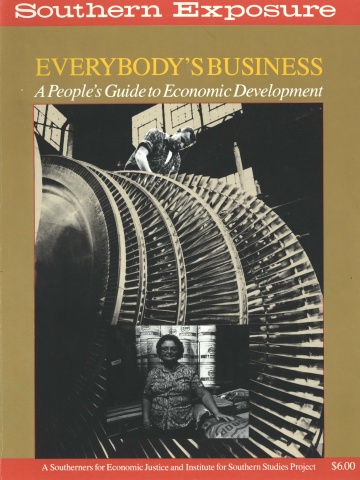Widening Your Circles

This article originally appeared in Southern Exposure Vol. 14 No. 5/6, "Everybody's Business." Find more from that issue here.
Regional church bodies are in a unique position to bring together people, including community leaders, from diverse backgrounds. Take the experience of the West Virginia Council of Churches, an ecumenical body of mainline denominations. In September 1986, it sponsored a series of forums on West Virginia's economic development policy. Participants from business, labor, government, community groups, and the public were invited to sessions called "The Ethics of Economic Development."
The purpose was twofold. First, the council wanted to open new channels of dialogue, and the range of participants attests to its success. They included the state's assistant treasurer and investor, the Episcopal bishop, representatives from the United Mine Workers and W.Va. Public Employees/ AFSCME, the commissioner of the state department of agriculture, officers of the state chapter of the National Organization for Women, president of the state chamber of commerce, the majority leader from the state senate, the economic development assistant to Congressman Bob Wise, activist leaders, academics, other labor leaders, and managers from the worker-owned Wierton Steel.
Second, says Carol Sharlip, who helped organize the forums, "We wanted to inject the question of human values and ethics into the economic development discussion, to broaden the discussion beyond the profit-and-loss mentality." Each conference included lots of room for audience participation, sessions on topics like "Local Development Initiatives and Out-of-State Businesses in West Virginia Communities," and side-by-side presentations by such unlike minded individuals as the heads of the state department of commerce and the Charleston-based Women and Employment. The three forums, held at the state capitol, were structured to allow presentations by speakers on assigned topics, then discussion by a panel of participants.
According to Sharlip, people came prepared to talk, and many participants heard from "the other side" for the first time: "Some people said to us afterwards that it was the first time that they had been able to get together with members from some of these other communities. We feel that some very useful contacts were made, and there's going to be some continuing relationships formed and some continuing dialogue."
What's next? Council leaders realize that their message of a coordinated, critical approach to economic development didn't reach as broad an audience as they had hoped; attendance by the general public was slim. The council now plans to publish some of the papers from the forums, distribute copies to county commission offices statewide, and get edited versions published in the state's newspapers.
Council staff did considerable research to prepare for the forums, and that research has suggested some vital program areas for the future. For example, having learned that buying locally boosts the local economy (profits aren't extracted), they are considering publishing a "Buy Local" directory of state businesses to distribute to West Virginia churches.
The research and the forums have given the council a credible base in the area of economic development and set the stage for additional forums and further work. "On the basis of work we had done with the forums, a council representative was invited to participate at a legislative committee meeting on economic development," says Sharlip. "We've also been asked to speak to church gatherings. It's really one of those things where you drop a pebble in the pool and the circles kind of widen out."